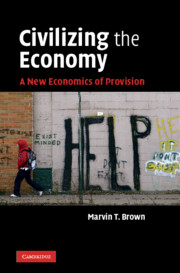Book contents
- Frontmatter
- Contents
- List of figures
- List of tables
- Preface
- 1 Introduction: creating a just and sustainable economy
- Part I Creating a new economic framework
- Part II The civic option
- 5 From property relations to civic relations
- 6 Society, civil society, and the market
- 7 Restoring reciprocity
- 8 Civic norms and market competition
- Part III A civic view of labor, land, and money
- Part IV Civilizing economic systems
- Part V A civic agenda
- Appendix: Free enterprise and the economics of slavery
- Bibliography
- Index
5 - From property relations to civic relations
Published online by Cambridge University Press: 05 June 2012
- Frontmatter
- Contents
- List of figures
- List of tables
- Preface
- 1 Introduction: creating a just and sustainable economy
- Part I Creating a new economic framework
- Part II The civic option
- 5 From property relations to civic relations
- 6 Society, civil society, and the market
- 7 Restoring reciprocity
- 8 Civic norms and market competition
- Part III A civic view of labor, land, and money
- Part IV Civilizing economic systems
- Part V A civic agenda
- Appendix: Free enterprise and the economics of slavery
- Bibliography
- Index
Summary
Switching from the language of an economics of property to the language of an economics of provision is an essential step in civilizing the economy, but it is not enough. We also must replace the economy's current foundation of property relations with a new foundation of civic relations. To do that, we need to develop an adequate understanding of the civic.
The following chapters explore the civic meaning of property, the relationship between the civic, the commercial, and the social, the civic norm of reciprocity, and civic competition. These explorations should give us a broad enough view of the civic to understand how it might function as the foundation for a just and sustainable economy. We will be building on what we have already said about the civic sphere, which can be summarized as shown in Figure 5.1.
As we outline the move to a civic view of the economy, it will become clear that some changes will be more difficult than others. Many conversations about economic options seem to be limited to the alternatives of capitalism or socialism. Most economies, of course, contain a mixture of the two, but this mixture seldom is taken seriously. Too often, the terms are simply used as trigger words to smear an opposing point of view. This book's approach is civic, instead of socialist. It imagines the economy in the hands of citizens; not in the hands of invisible forces that protect either privileged groups or government bureaucracies.
- Type
- Chapter
- Information
- Civilizing the EconomyA New Economics of Provision, pp. 59 - 68Publisher: Cambridge University PressPrint publication year: 2010



